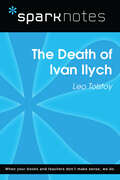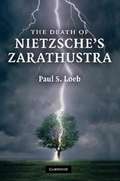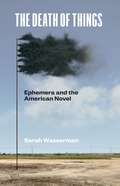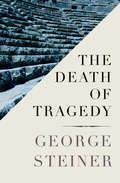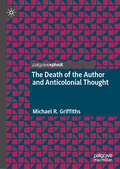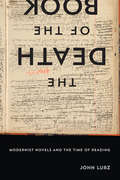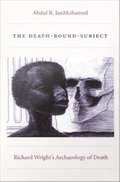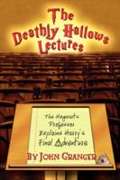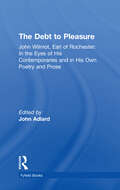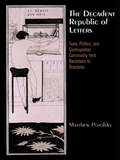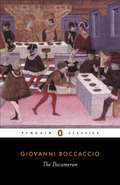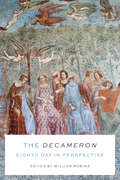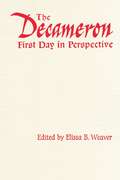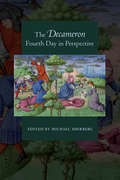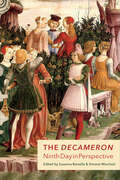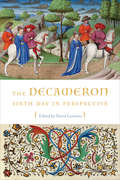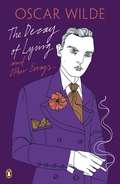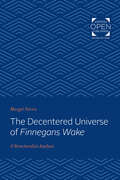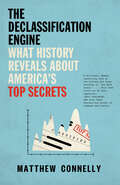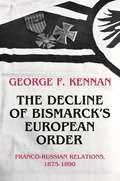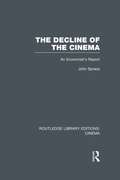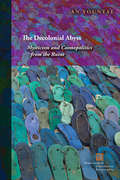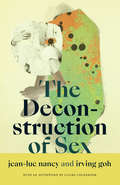- Table View
- List View
The Death of Ivan Ilych (SparkNotes Literature Guide Series)
by SparkNotesThe Death of Ivan Ilych (SparkNotes Literature Guide) by Leo Tolstoy Making the reading experience fun! Created by Harvard students for students everywhere, SparkNotes is a new breed of study guide: smarter, better, faster.Geared to what today's students need to know, SparkNotes provides:chapter-by-chapter analysis explanations of key themes, motifs, and symbols a review quiz and essay topics Lively and accessible, these guides are perfect for late-night studying and writing papers.
The Death of Nietzsche's Zarathustra
by Paul S. LoebIn this study of Nietzsche's Thus Spoke Zarathustra, Paul S. Loeb proposes a new account of the relation between the book's literary and philosophical aspects and argues that the book's narrative is designed to embody and exhibit the truth of eternal recurrence. Loeb shows how Nietzsche constructed a unified and complete plot in which the protagonist dies, experiences a deathbed revelation of his endlessly repeating life, and then returns to his identical life so as to recollect this revelation and gain a power over time that advances him beyond the human. Through close textual analysis and careful attention to Nietzsche's use of Platonic, Biblical, and Wagnerian themes, Loeb explains how this novel design is the key to solving the many riddles of Thus Spoke Zarathustra - including its controversial fourth part, its obscure concept of the Übermensch, and its relation to Nietzsche's Genealogy of Morals.
The Death of Things: Ephemera and the American Novel
by Sarah WassermanA comprehensive study of ephemera in twentieth-century literature—and its relevance to the twenty-first century &“Nothing ever really disappears from the internet&” has become a common warning of the digital age. But the twentieth century was filled with ephemera—items that were designed to disappear forever—and these objects played crucial roles in some of that century&’s greatest works of literature. In The Death of Things, author Sarah Wasserman delivers the first comprehensive study addressing the role ephemera played in twentieth-century fiction and its relevance to contemporary digital culture. Representing the experience of perpetual change and loss, ephemera was central to great works by major novelists like Don DeLillo, Ralph Ellison, and Marilynne Robinson. Following the lives and deaths of objects, Wasserman imagines new uses of urban space, new forms of visibility for marginalized groups, and new conceptions of the marginal itself. She also inquires into present-day conundrums: our fascination with the durable, our concerns with the digital, and our curiosity about what new fictional narratives have to say about deletion and preservation. The Death of Things offers readers fascinating, original angles on how objects shape our world. Creating an alternate literary history of the twentieth century, Wasserman delivers an insightful and idiosyncratic journey through objects that were once vital but are now forgotten.
The Death of Tragedy
by George SteinerAn engrossing and provocative look at the decline of tragedy in modern art"All men are aware of tragedy in life. But tragedy as a form of drama is not universal." So begins George Steiner's adept analysis of the demise of classic tragedy as a dramatic depiction of heroism and suffering. In The Death of Tragedy, Steiner examines the uniqueness and importance of the Greek classical tragedy--from antiquity to the age of Jean Racine and William Shakespeare--as providing stark insight into the grief and joy of human existence. Then, delving into the works of John Keats, Henrik Ibsen, Samuel Beckett, and many more, Steiner demonstrates how the tragic voice has greatly diminished in modern theater, and what we have lost in the process.
The Death of the Author and Anticolonial Thought
by Michael R. GriffithsThe Death of the Author and Anticolonial Thought promises to transform a decades old debate in literary studies about the relation between structure and agency, form and intention by giving a detailed account—previously unstudied—of the way colonized writers have responded to, learned from, and critiqued the death of the author postulate declared by Roland Barthes in 1967. The book is a cultural history of these debates—with a particular focus on two crucial two key case studies, Martinican poet and thinker Édouard Glissant and Palestinian literary and cultural critic Edward Said, this book, then, examines the immediate emergence and intensification of such responses to the postulate of the author’s deathly absence from the text, in order to suggest that metropolitan literary theory drew both critique and engagement from scholars of black, decolonial and Global South background from both before 1967 and Barthes’s declaration and in its wake. This book provides a focused account of the early history of the way global literatures have engaged with, critiqued, and occasionally adopted the lessons and limitations of the poststructuralist critique of that most fetishised and also reviled of figures: the author.
The Death of the Book: Modernist Novels and the Time of Reading
by John LurzAn examination of the ways major novels by Marcel Proust, James Joyce, and Virginia Woolf draw attention to their embodiment in the object of the book, The Death of the Book considers how bookish format plays a role in some of the twentieth century’s most famous literary experiments. Tracking the passing of time in which reading unfolds, these novels position the book’s so-called death in terms that refer as much to a simple description of its future vis-à-vis other media forms as to the sense of finitude these books share with and transmit to their readers.As he interrogates the affective, physical, and temporal valences of literature’s own traditional format and mode of access, John Lurz shows how these novels stage intersections with the phenomenal world of their readers and develop a conception of literary experience not accounted for by either rigorously historicist or traditionally formalist accounts of the modernist period. Bringing together issues of media and mediation, book history, and modernist aesthetics, The Death of the Book offers a new and deeper understanding of the way we read now.
The Death-Bound-Subject: Richard Wright's Archaeology of Death
by Abdul R. JanmohamedDuring the 1940s, in response to the charge that his writing was filled with violence, Richard Wright replied that the manner came from the matter, that the "relationship of the American Negro to the American scene [was] essentially violent," and that he could deny neither the violence he had witnessed nor his own existence as a product of racial violence. Abdul R. JanMohamed provides extraordinary insight into Wright's position in this first study to explain the fundamental ideological and political functions of the threat of lynching in Wright's work and thought. JanMohamed argues that Wright's oeuvre is a systematic and thorough investigation of what he calls the death-bound-subject, the subject who is formed from infancy onward by the imminent threat of death. He shows that with each successive work, Wright delved further into the question of how living under a constant menace of physical violence affected his protagonists and how they might "free" themselves by overcoming their fear of death and redeploying death as the ground for their struggle. Drawing on psychoanalytic, Marxist, and phenomenological analyses, and on Orlando Patterson's notion of social death, JanMohamed develops comprehensive, insightful, and original close readings of Wright's major publications: his short-story collection Uncle Tom's Children; his novels Native Son, The Outsider, Savage Holiday, and The Long Dream; and his autobiography Black Boy/American Hunger. The Death-Bound-Subject is a stunning reevaluation of the work of a major twentieth-century American writer, but it is also much more. In demonstrating how deeply the threat of death is involved in the formation of black subjectivity, JanMohamed develops a methodology for understanding the presence of the death-bound-subject in African American literature and culture from the earliest slave narratives forward.
The Deathly Hallows Lectures: The Hogwarts Professor Explains the Final Harry Potter Adventure
by John GrangerThe fastest-selling book in publication history, Harry Potter and the Deathly Hallows was a critical success and is loved by fans around the world. In The Deathly Hallows Lectures, John Granger reveals the Potter finale's brilliant details, themes and meanings. Even the most ardent of Harry Potter fans will be surprised by and delighted with the Hogwarts Professor's explanations of the four dimensions of meaning in Deathly Hallows to include: * why Ms. Rowling chose to make Lily's eyes green, * why Harry buried Moody's eye where and when he did, and * why Ollivander prefers the three wand cores he does. Ms. Rowling has said that alchemy sets the "parameters of magic" in the series; after reading the chapter-length explanation of Deathly Hallows as the final stage of the alchemical Great Work in The Deathly Hallows Lectures, the serious reader will understand how important literary alchemy is in understanding Rowling's artistry and accomplishment. The other seven chapters explore, among other things, the five writing tricks Ms. Rowling uses to work her story magic, the deciphering of the "Triangular Eye" symbol for the three Hallows, Harry's "struggle to believe" in Albus Dumbledore, why Ms. Rowling revealed that she "always thought" of the Headmaster as gay, and the more than 25 echoes of her first book, Philosopher's Stone, in Deathly Hallows. Did you wonder why Fred died in the end? Why Harry went underground seven times in Deathly Hallows? Granger explains how Ms. Rowling's story formula required these twists as well as two trips to King's Cross and two meetings with Albus Dumbledore at story's end. If you're a serious reader and serious fan of Harry Potter, The Deathly Hallows Lectures is a must!
The Debt to Pleasure: John Wilmot, Earl of Rochester: In the Eyes of His Contemporaries and in His Own Poetry and Prose
by John WilmotRochester, incontestably the greatest of the Restoration poets and reprobates, is presented in The Debt to Pleasure both in his own words and in the words of those who loved and loathed him. The book is a mosaic in which the poet's voice and the voice of his age sound with startling, ribald and riotous clarity.
The Decadent Republic of Letters
by Matthew PotolskyWhile scholars have long associated the group of nineteenth-century French and English writers and artists known as the decadents with alienation, escapism, and withdrawal from the social and political world, Matthew Potolsky offers an alternative reading of the movement. In The Decadent Republic of Letters, he treats the decadents as fundamentally international, defined by a radically cosmopolitan ideal of literary sociability rather than an inward turn toward private aesthetics and exotic sensation.The Decadent Republic of Letters looks at the way Charles Baudelaire, Théophile Gautier, and Algernon Charles Swinburne used the language of classical republican political theory to define beauty as a form of civic virtue. The libertines, an international underground united by subversive erudition, gave decadents a model of countercultural affiliation and a vocabulary for criticizing national canon formation and the increasing state control of education. Decadent figures such as Joris-Karl Huysmans, Walter Pater, Vernon Lee, Aubrey Beardsley, and Oscar Wilde envisioned communities formed through the circulation of art. Decadents lavishly praised their counterparts from other traditions, translated and imitated their works, and imagined the possibility of new associations forged through shared tastes and texts. Defined by artistic values rather than language, geography, or ethnic identity, these groups anticipated forms of attachment that are now familiar in youth countercultures and on social networking sites.Bold and sophisticated, The Decadent Republic of Letters unearths a pervasive decadent critique of nineteenth-century notions of political community and reveals the collective effort by the major figures of the movement to find alternatives to liberalism and nationalism.
The Decameron
by Giovanni BoccaccioIn the summer of 1348, as the Black Death ravages their city, ten young Florentines take refuge in the countryside...Taken from the Greek, meaning 'ten-day event', Boccaccio's Decameron sees his characters amuse themselves by each telling a story a day, for the ten days of their confinement - a hundred stories of love and adventure, life and death, and surprising twists of fate. Less preoccupied with abstract concepts of morality or religion than earthly values, the tales range from the bawdy Peronella, hiding her lover in a tub, to Ser Cepperallo, who, despite his unholy effrontery, becomes a Saint. The result is a towering monument of European literature and a masterpiece of imaginative narrative that has inspired writers from Chaucer to Shakespeare . Translated with an introduction by G.H. McWilliam'McWilliam's finest work, his translation of Boccaccio's Decameron remains one of the most successful and lauded books in the series'The Times
The Decameron Eighth Day in Perspective (Toronto Italian Studies)
Divided into ten days of ten novellas each, Boccaccio’s Decameron is one of the literary gems of the fourteenth century. The Decameron Eighth Day in Perspective is an interpretive guide to the stories of the text’s Day Eight – a day dedicated to tales of tricks and practical jokes. By drawing on literary precursors such as fabliaux, epic, philosophy, exempla, Dante’s Commedia, and scripture, and by meditating on the dynamics of civic engagement in fourteenth-century Florence, Boccaccio develops in these stories of jests a self-consciously literary representation of the Florentine social imaginary. The essays in this volume, all written by prominent scholars, survey previous scholarship and open up new cultural and historical perspectives on Boccaccio’s sophisticated art of storytelling. They analyze both the literary sources that Boccaccio’s comic narratives transform, as well as the political, legal, and ethical contexts with which they engage. Each contributor tackles a single tale, yet their essays also register major themes and concerns that recur throughout Day Eight, allowing for close connections among the essays.
The Decameron First Day in Perspective: The Lectura Boccaccii (The Royal Society of Canada Special Publications)
by Elissa B. WeaverGiovanni Boccaccio's Decameron is the best known and most read work in Italian literature next to Dante's Divine Comedy. In the tradition of Lectura Dantis, the practice of story-by-story critical readings of Dante's work, Elissa Weaver has collected essays from some of the most prominent American Boccaccio scholars to provide critical readings of the Decameron Proem, Introduction, and the ten stories that constitute the first of the ten 'days' of storytelling.The first of the twelve essays opens the volume with a consideration of the Proem, demonstrating the importance of Boccaccio's literary subtexts (Ovidian and Dantean) for understanding his poetics. The second essay, on the Introduction, discusses the title of the work and the framing tale. The remaining ten contributions treat in detail each story, examining the literary, ethical, and social concerns embodied in the short narratives and in the context provided by the comments and discussions of the story-tellers, and exploring the intertextual relations within the Decameron and with sources and analogues. This inaugural book in a new series of critical essays on the Decameron will provide an important guide to reading the complex series of narratives that constitute the opening of the Decameron and will serve as a guide to reading the entire work.
The Decameron Fourth Day in Perspective (Toronto Italian Studies)
by Michael SherbergThis volume, part of the Lectura Boccaccii series organized by the American Boccaccio Association, offers close readings by top scholars of Day Four of the Decameron. As fans of the Decameron know, the Fourth Day opens with an important intervention in which the author defends his project against his critics, which coincides with a significant change in tone as the subject matter turns to stories with unhappy endings. The contributors approach the stories from a variety of perspectives, including the linguistic, philosophical, anthropological, and literary historical. These fresh readings of stories that are nearly seven hundred years old testify to the enduring power of Boccaccio’s masterpiece to speak to new audiences and to find compelling relevance even at a great distance from its immediate medieval context.
The Decameron Ninth Day in Perspective (Toronto Italian Studies)
by Simone Marchesi Susanna BarsellaThe Ninth Day of Giovanni Boccaccio’s Decameron is significant both for numerological and structural reasons. Whether we consider the Decameron as reproducing an itinerary toward the attainment of virtue or following other possible interpretive schematics, Day Nine remains a liminal moment of pause before the inception of the final stories dedicated to the highest civic virtues of liberality and magnificence. This collection is comprised of extensive and rigorous essays by leading experts in the field of Boccaccio studies and medieval literature, shedding new critical light on the Ninth Day. The volume incorporates a multitude of disciplinary perspectives including literary studies, visual arts, political history, and gender studies. Taking a holistic approach, the contributors to the volume trace the dense and multi-layered web of interrelations between the narrative units and the rest of the Decameron. Connections between individual stories are highlighted and interactions between Day Nine and its counterparts in the book are analysed. In doing so, The Decameron Ninth Day in Perspective synthesizes existing scholarship but also opens up new horizons for future work.
The Decameron Sixth Day in Perspective (Toronto Italian Studies)
by David LummusThe Sixth Day of Giovanni Boccaccio’s Decameron marks a new beginning. Its first story is the structural centre of the one hundred tales and signals the start of the day’s reflection on the power of the word as the fundamental building block of human communication. This collection gathers together readings of each of the ten stories in Day Six of the Decameron – the shortest of the entire work. Featuring a diverse group of literary scholars whose expertise is not limited to Boccaccio studies, the collection offers both comprehensive accounts of the tales and new interpretations of their significance. A major contribution to the study of the Decameron, it will also serve as an excellent starting point for new readers of Boccaccio’s masterpiece. The readings demonstrate how Boccaccio engaged in rethinking or elaborating on the heritage of Western literature and thought, including the Bible; the works of Dante; the Roman literary, rhetorical, and legal tradition; the writings of the Church Fathers; and the ideas of scholastic theologians. These lecturae employ a range of methodologies that account for both historical and theoretical issues in their engagement with Boccaccio's poetic and ethical project in the Decameron.
The Decameron Third Day in Perspective
by Pier Massimo Forni Francesco CiabattoniDivided into ten days of ten novellas each, Giovanni Boccaccio's Decameron is one of the literary gems of the fourteenth century. The 'Decameron' Third Day in Perspective is an interpretive guide to the stories of the text's Third Day. For each novella, a distinguished Boccaccio scholar offers an essay that both reviews the current scholarly literature and advances new and intriguing interpretations of the work. The whole collection reflects the series's guiding principle of examining the text "in perspective," revealing the connections among the novellas, the Days, and the framing narrative that holds the whole Decameron together.The second of the University of Toronto Press's interpretive guides to Boccaccio's Decameron, this collection forms part of an ambitious project to examine the entire Decameron, Day by Day.
The Decay of Lying: And Other Essays
by Oscar WildeIn 'The Decay of Lying' Oscar Wilde uses his decadent ideology in an attempt to reverse and therefore reject his audiences' 'normal' conceptualizations of nature, art and morality. Wilde's views of life and art are illustrated through the use of Platonic dialogue where the character Vivian takes on the persona of Wilde. Wilde's goal is to subvert the norm by reversing its values. Wilde suggests to us that society is wrong, not him. Calling on diverse examples - from Ancient Greek sculpture to contemporary paintings - Oscar Wilde's brilliant essay creates a witty, paradoxical world in which the only Art worth loving is that built on complete untruths.
The Decentered Universe of Finnegans Wake: A Structuralist Analysis
by Margot NorrisOriginally published in 1977. The pioneer critics of Finnegans Wake hailed the work as a radical critique of language and civilization. Resuming their position, Margot Norris explains the book's most intractable uncertainties not as puzzles to be solved by a clever reader but as manifestations of a "chaosmos," a Freudian dream world of sexual transgression and social dissolution, of inauthentic being and empty words. Conventional moralities and restraints are under siege in this chaosmos, where precisely those desires and forbidden wishes that are barred in waking thought strive to make themselves felt. Norris demonstrates convincingly that the protean characters of Finnegans Wake are the creatures of a dreaming mind. The teleology of their universe is freedom, and in the enduring struggle between the individual's anarchic psyche and the laws that make civilization possible, it is only in dream that the psyche is triumphant. It is as dream rather than as novel that Norris reads Finnegans Wake. The lexical deviance and semantic density of the book, Norris argues, are not due to Joyce's malice, mischief, or megalomania but are essential and intrinsic to his concern to portray man's inner state of being. Because meanings are dislocated—hidden in unexpected places, multiplied and split, given over to ambiguity, plurality, and uncertainty—the Wake, Norris claims, represents a decentered universe. Its formal elements of plot, character, discourse, and language are not anchored to any single point of reference; they do not refer back to center. Only by abandoning conventional frames of reference can readers allow the work to disclose its own meanings, which are lodged in the differences and similarities of its multitudinous elements.Eschewing the close explication of much Wake criticism, the author provides a conceptual framework for the work's large structures with the help of theories and methods borrowed from Freud, Heidegger, Lacan, Levi-Strauss, and Derrida. Looking at the work without novelistic expectations of the illusion of some "key" to unlock the mystery, Norris explores Joyce's rationale for committing his last human panorama—a bit sadder than Ulysses in its concern with aging, killing, and dying—to a form and language belonging to the deconstructive forces of the twentieth century.
The Declassification Engine: What History Reveals About America's Top Secrets
by Matthew ConnellySHORTLISTED FOR THE CUNDHILL HISTORY PRIZE • Every day, thousands of new secrets are created by the United States government. What is all this secrecy really for? And whom does it benefit?&“A brilliant, deeply unsettling look at the history and inner workings of &‘the dark state'.... At a time when federal agencies are increasingly classifying or destroying documents with historical significance, this book could not be more important.&” —Eric Schlosser, New York Times best-selling author of Command and ControlBefore World War II, transparent government was a proud tradition in the United States. In all but the most serious of circumstances, classification, covert operations, and spying were considered deeply un-American. But after the war, the power to decide what could be kept secret proved too tempting to give up. Since then, we have radically departed from that open tradition, allowing intelligence agencies, black sites, and classified laboratories to grow unchecked. Officials insist that only secrecy can keep us safe, but its true costs have gone unacknowledged for too long. Using the latest techniques in data science, historian Matthew Connelly analyzes a vast trove of state secrets to unearth not only what the government really did not want us to know but also why they didn&’t want us to know it. Culling this research and carefully examining a series of pivotal moments in recent history, from Pearl Harbor to drone warfare, Connelly sheds light on the drivers of state secrecy— especially incompetence and criminality—and how rampant overclassification makes it impossible to protect truly vital information. What results is an astonishing study of power: of the greed it enables, of the negligence it protects, and of what we lose as citizens when our leaders cannot be held to account. A crucial examination of the self-defeating nature of secrecy and the dire state of our nation&’s archives, The Declassification Engine is a powerful reminder of the importance of preserving the past so that we may secure our future.
The Decline and Fall of the Lettered City: Latin America in the Cold War (Convergences: Inventories of the Present #24)
by Jean FrancoThe cultural Cold War in Latin America was waged as a war of values--artistic freedom versus communitarianism, Western values versus national cultures, the autonomy of art versus a commitment to liberation struggles--and at a time when the prestige of literature had never been higher. The projects of the historic avant-garde were revitalized by an anti-capitalist ethos and envisaged as the opposite of the republican state. The Decline and Fall of the Lettered City charts the conflicting universals of this period, the clash between avant-garde and political vanguard. This was also a twilight of literature at the threshold of the great cultural revolution of the seventies and eighties, a revolution to which the Cold War indirectly contributed. In the eighties, civil war and military rule, together with the rapid development of mass culture and communication empires, changed the political and cultural map. A long-awaited work by an eminent Latin Americanist widely read throughout the world, this book will prove indispensable to anyone hoping to understand Latin American literature and society. Jean Franco guides the reader across minefields of cultural debate and histories of highly polarized struggle. Focusing on literary texts by García Marquez, Vargas Llosa, Roa Bastos, and Juan Carlos Onetti, conducting us through this contested history with the authority of an eyewitness, Franco gives us an engaging overview as involving as it is moving.
The Decline of Bismarck's European Order: Franco-Russian Relations 1875-1890
by George Frost KennanIn an attempt to discover some of the underlying origins of World War I, the eminent diplomat and writer George Kennan focuses on a small sector of offstage events to show how they affected the drama at large long before the war even began. In the introduction to his book George Kennan tells us, "I came to see World War I . . . as the great seminal catastrophe of this century--the event which . . . lay at the heart of the failure and decline of this Western civilization." But, he asks, who could help being struck by the contrast between this apocalyptic result and the "delirious euphoria" of the crowds on the streets of Europe at the outbreak of war in 1914! "Were we not," he suggests, "in the face of some monstrous miscalculation--some pervasive failure to read correctly the outward indicators of one's own situation?" It is from this perspective that Mr. Kennan launches a "micro-history" of the Franco-Russian relationship as far back as the 1870s in an effort to determine the motives that led people "to wander so blindly" into the horrors of the First World War.
The Decline of the Cinema: An Economist’s Report (Routledge Library Editions: Cinema)
by John SpraosBetween 1952 and 1962, when this book was originally published, the number of people visiting British cinemas had fallen by nearly two thirds and was little more than half the pre-war total. Nearly 1500 of the 4500 cinemas functioning in 1955 had closed five years later, and the author here predicts a further substantial fall. The causes of this drastic decline are traced to the competition of television but also to the dramatic halving of the number of new American films and to the difficulty of transferring a cinema’s ‘congregation’ when it is closed. This decline has few parallels in recent times and in conjunction with a disproportionate and unexpected increase in the price of seats presents a fascinating study for the economist, which the author fully exploits. But the film industry is of general interest so that the author’s conclusions and his social recommendations will appeal to the general reader as well as those in the industry.
The Decolonial Abyss: Mysticism and Cosmopolitics from the Ruins (Perspectives in Continental Philosophy)
by An YountaeThe Decolonial Abyss probes the ethico-political possibility harbored in Western philosophical and theological thought for addressing the collective experience of suffering, socio-political trauma, and colonial violence. In order to do so, it builds a constructive and coherent thematization of the somewhat obscurely defined and underexplored mystical figure of the abyss as it occurs in Neoplatonic mysticism, German Idealism, and Afro-Caribbean philosophy.The central question An Yountae raises is, How do we mediate the mystical abyss of theology/philosophy and the abyss of socio-political trauma engulfing the colonial subject? What would theopoetics look like in the context where poetics is the means of resistance and survival? This book seeks to answer these questions by examining the abyss as the dialectical process in which the self’s dispossession before the encounter with its own finitude is followed by the rediscovery or reconstruction of the self.
The Deconstruction of Sex (a Cultural Politics book)
by Jean-Luc Nancy Irving GohIn The Deconstruction of Sex, Jean-Luc Nancy and Irving Goh discuss how a deconstructive approach to sex helps us negotiate discourses about sex and foster a better understanding of how sex complicates our everyday existence in the age of #MeToo. Throughout their conversation, Nancy and Goh engage with topics ranging from relation, penetration, and subjection to touch, erotics, and jouissance. They show how despite its entrenchment in social norms and centrality to our being-in-the-world, sex lacks a clearly defined essence. At the same time, they point to the potentiality of literature to inscribe the senses of sex. In so doing, Nancy and Goh prompt us to reconsider our relations with ourselves and others through sex in more sensitive, respectful, and humble ways without bracketing the troubling aspects of sex.
